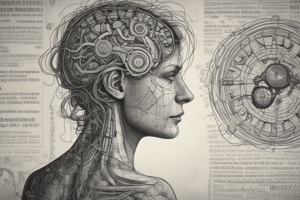Podcast
Questions and Answers
What are the benefits of having laws?
What are the benefits of having laws?
Laws provide order, safety, and a means to resolve conflicts.
What is forensic psychology?
What is forensic psychology?
Forensic psychology applies psychological principles to legal matters.
What does "confidence did not equal correctness" mean in the context of eyewitness testimony?
What does "confidence did not equal correctness" mean in the context of eyewitness testimony?
It means that a confident witness is not necessarily a reliable one.
According to the realist movement, laws should remain static and unchanging to ensure stability.
According to the realist movement, laws should remain static and unchanging to ensure stability.
The criminal justice system primarily aims to discover the complete truth during trials.
The criminal justice system primarily aims to discover the complete truth during trials.
What are the two major models of the criminal justice system?
What are the two major models of the criminal justice system?
Which of the following is NOT a key principle used in making sentencing decisions?
Which of the following is NOT a key principle used in making sentencing decisions?
What is the main goal of therapeutic jurisprudence?
What is the main goal of therapeutic jurisprudence?
Which of the following is NOT a core component of therapeutic jurisprudence?
Which of the following is NOT a core component of therapeutic jurisprudence?
What is a "psycholegal soft spot"?
What is a "psycholegal soft spot"?
Flashcards
Forensic Psychology
Forensic Psychology
The application of psychological principles to legal issues.
Eyewitness Testimony
Eyewitness Testimony
A description of an event by someone who saw it.
Realist Movement
Realist Movement
Law should be evaluated based on its effects and serve society's needs.
Psychology in Legal Proceedings
Psychology in Legal Proceedings
Signup and view all the flashcards
Forensic Psychologist Roles
Forensic Psychologist Roles
Signup and view all the flashcards
Consensus View of Law
Consensus View of Law
Signup and view all the flashcards
Conflict View of Law
Conflict View of Law
Signup and view all the flashcards
Interactionist View of Law
Interactionist View of Law
Signup and view all the flashcards
Individual Rights vs. Common Good
Individual Rights vs. Common Good
Signup and view all the flashcards
Due Process Model
Due Process Model
Signup and view all the flashcards
Crime Control Model
Crime Control Model
Signup and view all the flashcards
Equality vs. Discretion in Law
Equality vs. Discretion in Law
Signup and view all the flashcards
Principle of Proportionality
Principle of Proportionality
Signup and view all the flashcards
Sentencing Disparity
Sentencing Disparity
Signup and view all the flashcards
Implicit Bias
Implicit Bias
Signup and view all the flashcards
Determinate Sentencing
Determinate Sentencing
Signup and view all the flashcards
Truth vs. Conflict Resolution
Truth vs. Conflict Resolution
Signup and view all the flashcards
Plea Bargaining
Plea Bargaining
Signup and view all the flashcards
Settlement Negotiation
Settlement Negotiation
Signup and view all the flashcards
Therapeutic Jurisprudence
Therapeutic Jurisprudence
Signup and view all the flashcards
Mental Health Court
Mental Health Court
Signup and view all the flashcards
Attribution Theory
Attribution Theory
Signup and view all the flashcards
Study Notes
Forensic Psychology
- Forensic psychology encompasses anything related to law
- Key factors influencing the definition: the degree of narrowness and breadth of the field itself, the relationship between research and practice, and the application and practical use as it applies to legal matters
- Forensic psychologists work with legal, contractual and administrative matters
- Forensic practice encompasses how psychological knowledge is applied to law, emphasizing research
History of Forensic Psychology
- Key figures in the early 19th century included Cattell and research on eyewitness testimony
- Early insights highlighted discrepancies between confidence and correctness in eyewitness accounts and the influence of external factors on judgment
- Emphasis on the role of the father of psych and law regarding influences on women in the workplace and the development of psych inquiry in law
- The study of law and behavior, particularly as presented by Llewellyn, recognized the significance of societal change in its context with the law
Implications of Law and Psychology
- Society evolves at a faster pace than law; laws need constant review to ensure they continue supporting societal needs
- Law should not be the ultimate goal; it is a means to achieve social aims or ends
- Modern psychology plays a critical role in evaluating the impact of law, including its effectiveness and suitability in societal contexts
Forensic Psychology Subspecialties
- Police Psychology: focuses on the clinical and practical skills for law enforcement and public safety
- Legal Psychology: involves the role of psychology in court settings, including jury selection, assessment of competency, and insanity defense
- Criminal Psychology: explores the behavioral and mental processes of offenders, aiming to reduce criminal behavior
- Victim Psychology: examines the experiences of persons who experience harm from crimes, focusing on research, education, and policy
- Correctional Psychology: involves applying psychological principles to correctional systems and evaluating inmates
Laws as Human Creation
- Laws are dynamic and evolve based on societal needs for order, safety, and change
- Legal systems help manage disagreements, protect rights, and resolve conflicts that may arise.
- Laws reflect the evolving and challenging relationship between people’s actions and rights
Psychological Study of Law
- Individual behavior is shaped by personal qualities and the external environment or context
- External environment pressures, contextually and situationally, influence human behavior, which is considered relevant to legal decisions
Basic Choices in the Psychological Study of Law
- Laws frequently present dilemmas because rights for one might be problematic for others
- Conflicts may arise when various goals are incompatible or when values or choices vary in importance
- Balancing rights of the individual against the common good is a key issue in law and society
- Two primary models for how legal systems function: the rights of individuals must be protected, and a system to control crime that ensures that lawbreakers are apprehended and punished, and hence contained
Equality vs Discretion
- Equality (in the legal system) emphasizes similar treatment for similar crimes committed by comparable individuals
- Discretion involves the consideration of unique circumstances in assessing culpability and determining the appropriate response.
Truth vs Conflict Resolution/Justice
- Truth and conflict resolution need to balance perspectives and goals related to individual rights, social justice, and the need for resolving disputes
- Procedural justice aims to resolve these disputes in fair ways by acknowledging and considering the perspectives of both sides while determining the fairest process.
Science vs Law
- Law often relies on authority, precedence and case method
- Psychology relies on scientific methods such as empirical research, experiments and the application of scientific data.
Studying That Suits You
Use AI to generate personalized quizzes and flashcards to suit your learning preferences.




